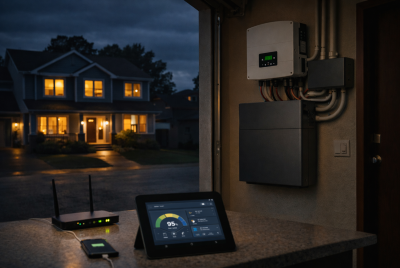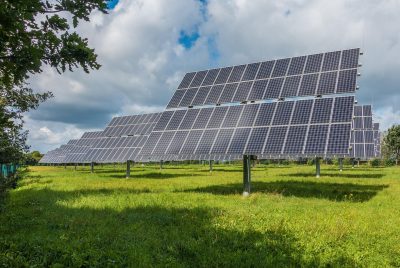Solar Power Battery: Your Guide to Energy Storage Solutions
You know, not too long ago, during another power outage, I found myself stumbling around in the dark and running into every possible piece of furniture. At that point, I realized I needed a change, which is how I ended up discovering solar energy (why does the coffee table always seem to be in a different spot in the dark?). I’m telling you, it’s changed the game!
Solar energy has become as necessary as coffee in the morning. It is no longer just a trendy term. Solar power batteries—those miraculous gadgets that allow you to store extra energy for a rainy day or an exceptionally dark night—are at the center of this renewable energy revolution. So grab a seat, regardless of whether you’re just looking at them, weighing the advantages, or considering installing one yourself! We’re delving further into the field of solar energy storage systems.
What Is a Solar Power Battery?
Picture a solar power battery like your home’s personal energy piggy bank. (Remember those old piggy banks you’d shake to hear the coins rattle?) On sunny days, your solar panels generate more energy than you can use, and instead of sending it back to the grid, you store it for later. It’s basically meal prepping, but for electricity.
When the sun’s hiding or it’s nighttime, your battery becomes your secret stash of power. It’s like having your own personal energy reserve, and let me tell you, that feels pretty darn empowering!
How Does a Solar Power Battery Work?
Alright, let’s break it down simply. Think of your solar battery as a reservoir of liquid sunshine. During the day, your solar panels soak up all that beautiful sunlight and convert it into electricity. Your home uses what it needs right away (you know, to keep the fridge humming and your favorite shows streaming on Netflix).
But what about the leftover juice? That goes straight into your battery for safekeeping. Later, when the sun goes down or clouds roll in, your home starts sipping from that energy reservoir. It’s like having a backup generator but without the noisy engine or gas fumes. (Your neighbors will appreciate it too.)
Types of Solar Power Batteries
Now, not all solar batteries are created equal. Let’s break down the most common types you’ll come across:
- Lithium-Ion Batteries
These are the cool kids of the solar battery world. They’re efficient, long-lasting, and compact—kind of like the smartphones of energy storage. They store a lot of energy in small spaces and last a good 10 to 15 years, making them a top choice if you’re looking for high efficiency without taking up too much room. - Lead-Acid Batteries
These are the old-school workhorses. Think of them like that trusty, no-frills car your grandpa swears by. They’re less expensive upfront but don’t last as long as lithium-ion batteries. Great for smaller, off-grid setups, like that dream cabin in the woods you’ve been eyeing. - Flow Batteries
Flow batteries are the new kids on the block with a lot of potential. They store energy using liquid electrolytes, which makes them great for large-scale systems. (I like to imagine tiny boats carrying energy across the battery.) These can be pricey for homes but offer long-lasting storage—perfect for commercial uses.
Why Should You Consider a Solar Power Battery?
You might be thinking, “Is this really worth it?” Here are a few reasons why it could be one of the smartest moves you make:
- Energy Independence
It’s like growing your own veggies but instead of tomatoes, you’re harvesting pure sunlight. With your own battery, you’re less dependent on the grid and those annoying electricity price hikes. Take that, surprise bills! - Backup Power During Outages
Remember my little 2 AM blackout adventure? With a solar battery, power outages become a distant memory. When the grid goes down, your home stays lit up. (Though I must admit, there’s something nostalgic about eating all the ice cream before it melts during a power outage.) - Lower Carbon Footprint
If you’re looking to go green without going to extremes (like skipping daily showers), solar batteries are a simple way to cut down on fossil fuel use. You get to save the planet and keep your air conditioning. Win-win!
The Lifespan of Solar Power Batteries
Here’s the lowdown: lithium-ion batteries typically last 10 to 15 years, while lead-acid batteries last around 5 to 10 years. (Kind of like the difference between getting a dog or a tortoise—they’re both great, but one sticks around a bit longer.)
When calculating your long-term savings, keep in mind how often you might need to replace the battery. No one likes unexpected expenses, so it’s good to plan ahead.
Sizing Your Solar Power Battery
Choosing the right size for your solar battery is like buying the perfect pair of jeans—too small and you’re uncomfortable, too big and you’ve wasted money. Here’s how you figure it out:
- Assess Your Energy Consumption
Take a peek at your energy bill to see how much power you use each month. (Spoiler: those late-night gaming marathons use more than you think.) Larger households need bigger batteries, so factor that in. - Solar Panel Output
Your battery size should also match how much energy your solar panels produce. If you’re generating more than you’re using during the day, you’ll need a battery that can store the excess for those cloudy or nighttime hours.
Cost of Solar Power Batteries
Okay, time for some real talk. Solar batteries can range from $5,000 to $15,000 depending on size, type, and installation. (I know, I had to sit down when I first saw those numbers too.)
But before you freak out, remember that the long-term savings can more than justify the initial investment. Plus, think of all the money you’ll save on candles during future blackouts!
Saving Money with Solar Power Batteries
While the upfront cost might give you pause, the savings add up. By reducing your reliance on the grid, you can cut down your electricity bills and even cash in on tax incentives. Over the years, that could save you thousands—enough to fund a serious latte habit!
Are Solar Power Batteries Safe?
Absolutely. Modern solar batteries, especially lithium-ion, come with built-in safety features to prevent overheating and short-circuiting. (Think of it like having a responsible adult chaperoning your wild electrons.)
Just be sure to follow manufacturer instructions and hire a professional for the installation. This isn’t the time to dust off your DIY skills unless you’re an electrician. Trust me.
How to Maintain Your Solar Power Battery
Good news! Solar batteries are pretty low-maintenance. (My kind of technology.) For lithium-ion batteries, all you need is the occasional checkup and to keep them in a well-ventilated space. Lead-acid batteries may need some water top-offs, but it’s still easier than caring for a high-maintenance pet. (I may or may not have named my battery “Sparky.”)
Disposing of Solar Power Batteries
When your battery finally reaches the end of its life, don’t just toss it. Most solar batteries, especially lithium-ion ones, can be recycled. It’s the responsible thing to do—like recycling old electronics but on a bigger, eco-friendlier scale.
Related Products to Consider for Your Solar Power System
If you’re setting up a solar system, here are a few extra gadgets to optimize everything:
- Solar Panels
Efficient panels generate more power and store more energy. It’s like making sure you’ve got all the ingredients before you start cooking. - Solar Inverters
These convert the direct current (DC) from your panels into alternating current (AC) used by most appliances. Think of them as your energy translator. - Solar Charge Controllers
These little devices keep your battery from overcharging and help extend its life. Think of them as energy traffic cops, keeping everything flowing smoothly. - Smart Energy Monitors
Want to see exactly how much energy you’re using and saving? These monitors track everything in real-time. (It’s like a Fitbit for your house’s energy.)
Research and Studies on Solar Power Batteries
Here are a couple of recent developments in the solar battery world:
- Advances in Solar Battery Materials
Researchers from the University of Córdoba and the Max Planck Institute developed a solar battery using 2D carbon nitride. This new material allows for simultaneous light absorption and energy storage, addressing issues of solar intermittency and improving efficiency. - System Design Innovations
A study in Vietnam on grid-tied rooftop solar systems with integrated battery storage showed a significant reduction in CO2 emissions and economic benefits for commercial buildings. Save the planet and your wallet? Yes, please!
The Future of Solar Power Batteries
The future of solar power batteries is looking brighter than a July afternoon. Ongoing research is aimed at making batteries more efficient, less expensive, and even more widely available. (I’m hoping for a world where solar batteries are as common as smartphones.)
Summary
Solar power batteries are a must if you want to get the most out of your solar panels. Whether you’re after energy independence, savings, or reducing your carbon footprint, these batteries can help. And with all the exciting advancements in the field, the future looks pretty sunny.
5 FAQs About Solar Power Batteries
- How long does a solar power battery last?
Lithium-ion batteries last around 10 to 15 years, while lead-acid ones last about 5 to 10 years. (Kind of like comparing dogs and tortoises.) - Can I go off-grid with a solar battery?
Yes! With enough solar panels and battery storage, you can reduce or eliminate your reliance on the grid. - Are solar power batteries worth the investment?
While pricey upfront, the long-term savings and peace of mind during power outages make them worth it. - Can I install a solar battery myself?
It’s best to leave this one to the pros. Electrical work isn’t the place for a DIY experiment unless you’re an expert. - What happens when my solar battery reaches the end of its life?
Most solar batteries can be recycled, which is great for the planet.
Solar power batteries offer a practical, eco-friendly solution for storing energy and ensuring you’re powered up when the sun isn’t shining. With the right setup, you can achieve energy independence, save money, and reduce your carbon footprint. (Plus, let’s be honest, it’s a great conversation starter at parties!) So, are you ready to join the solar revolution? The future is bright—literally!




